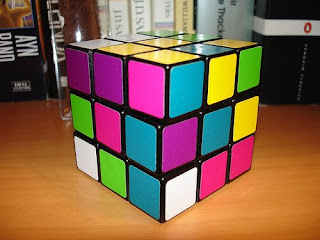
I've tried to reinforce that you are likely more intellectually capable than you may think. Unfortunately, I can't offer too many answers to the question of how to maximize these intellectual capabilities (if I could, I think I'd be rich). Instead, I've compiled an brief list based on multiple robust studies and what has historically been effective for many people. I'm sure the list will continually grow as we build better bridges to ply the gap between intangible psychology and pseudo-tangible cognitive neuroscience. In the meantime, here is my rudimentary list:
- A wide variety of balanced activities help expand the mind. This includes activities like sports, music and other extra-curricular activities. I already talked about TV and video games as they relate to children, but even in adults their use for entertainment purposes should be minimized. There are many educational TV programs and video games, but on average even the most academic ones tend to be more of a hindrance to learning compared with other activities. That said, there was a recent contestant on Jeopardy who said that she learns her facts from television documentaries and almost never reads books.
- In mathematics, repetition has proved very effective when it comes to improving performance. This is the basis of programs like the Kumon method. I do not generally endorse Kumon as as I think it's math fixation lacks cognitive balance. In principle though, these types of mind exercises (crosswords, puzzles, brain teasers, etc.) are all very effective.
- Adequate sleep improves short term memory and concentration. That could mean that, pulling an all-nighter to study doesn't necessarily improve performance in the exam that follows. That said, this is only a rule of thumb as adrenaline can reverse some of the effects of sleep deprivation on a temporary basis (i.e. prior to a major exam). Caffeine helps prevent drowsiness but does very little for memory and concentration. Generally speaking, recreational drugs are bad for the intellect and some even cause permanent and irreversible brain damage.
Opening Your Mind
 Albert Einstein has acquired the reputation of being one of the smartest minds of the 20th century. He rejected the assumption that time and space are absolute, and postulated the special theory of relativity. Not surprisingly, even the most respected scientists initially thought the idea that time was relative rather than absolute was nonsense. It was not until several years later when Einstein's abstract theory was considered proven by a celestial event that it became openly accepted by the scientific community. Among other things, Einstein's work produced the world's most famous equation, E=mc2, and eventually gave us the ability to recreate the energy of the sun (nuclear fusion/fission). Later in life, Einstein, like many of us, allowed age and experience to become a barrier to openness of thought. Although he was one of the scientists that helped develop quantum mechanical theory, he had notable difficulty accepting one of the philosophical consequences of it (a probabilistic universe rather than a deterministic one). Einstein was better than most in that he gave this consequence due consideration before saying he was "convinced that [God] does not play dice" with the universe.
Albert Einstein has acquired the reputation of being one of the smartest minds of the 20th century. He rejected the assumption that time and space are absolute, and postulated the special theory of relativity. Not surprisingly, even the most respected scientists initially thought the idea that time was relative rather than absolute was nonsense. It was not until several years later when Einstein's abstract theory was considered proven by a celestial event that it became openly accepted by the scientific community. Among other things, Einstein's work produced the world's most famous equation, E=mc2, and eventually gave us the ability to recreate the energy of the sun (nuclear fusion/fission). Later in life, Einstein, like many of us, allowed age and experience to become a barrier to openness of thought. Although he was one of the scientists that helped develop quantum mechanical theory, he had notable difficulty accepting one of the philosophical consequences of it (a probabilistic universe rather than a deterministic one). Einstein was better than most in that he gave this consequence due consideration before saying he was "convinced that [God] does not play dice" with the universe.Quite often people dismiss an idea as being stupid before giving it any real consideration. Unfortunately, this approach deprives them of a potential learning opportunity. That doesn't mean all ideas are good ones; it simply means all ideas need due consideration before they are dismissed. Even the least capable people can have great ideas and the brightest of people can come up with stupid ones. In response to a question, one of my old teachers once joked, "You're ask a really stupid question for such a smart student. [comedic pause] I'm just kidding... you're not that smart." On the other hand, let me end te final installment with an idea that will always be sincere:
You're smarter than you think.



.jpg)